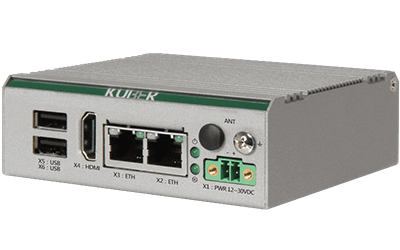What Is a Mini PC?

A mini PC, as the name suggests, is a type of computer shaped like a box.
It is attractive because of its small size and high performance. It can be installed in a space-saving manner and is more durable than a typical desktop PC, protecting the PC interior from the external environment, such as vibration, heat, and dust. This makes it ideal for industrial applications and use in harsh environments.
Performance is another area where mini PCs excel. They can be equipped with modern high-performance CPUs, memory, SSDs, etc., and can be designed in the optimal configuration for each application.
These characteristics make mini PCs an important choice for building or updating your IT infrastructure. The adoption of mini PCs, which are compact, robust, and high-performance, can greatly contribute to the efficiency and optimization of an organization.
Uses of Mini Pcs
Mini PCs, which are particularly robust and high-performance, demonstrate their capabilities in a wide range of business applications. Here are some examples, especially in the areas of factory automation, visual inspection, production control, and monitoring systems.
1. Factory Automation
The control and management of automated lines requires precise and fast computational processing, and a mini PC’s high performance and robustness meet these requirements, allowing factory automation to proceed smoothly.
The mini PC’s durability guarantees stable performance even in harsh factory environments, such as vibration, temperature changes, and dust.
2. Appearance Inspection
The mini PC’s high-speed image processing and analysis capabilities make it ideal for visual inspection of production lines; with Mini PC, minute defects in products can be detected in real time to improve quality control.
3. Production Control
Production control requires real-time processing and analysis of large amounts of data, and a mini PC’s powerful computing power makes this possible, providing powerful support for operations such as production volume optimization, inventory control, and delivery schedule optimization.
4. Monitoring System
A mini PC’s compact size and high performance make it ideal for video processing, analysis, and recording in surveillance systems. Its robustness also guarantees stable operation over long periods of time and allows for a quick response to any eventuality.
As described above, mini PCs can take advantage of their high performance and durability to demonstrate their capabilities in a variety of business domains. As these uses indicate, mini PC plays an important role in a wide range of industries.
Characteristics of Mini PCs
Most mini PCs are designed to be installed in a cabinet or rack. With a variety of interfaces, Mini PCs can be connected to displays or terminals in one or more separate locations.
Some can be connected to existing PCs, some are fanless, some are dustproof and waterproof, and some are made of antimicrobial plastic for medical applications. Thus, mini PCs (industrial PCs) have advantages over consumer PCs in terms of long-term stable supply of parts, high reliability of each part, and environmental resistance, such as the ability to be used in areas subject to vibration and dust.
On the other hand, the disadvantages are higher price and longer delivery time compared to consumer PCs.
How to Select a Mini PC
When selecting a mini PC, it is necessary to consider various factors, such as performance, durability, and cost performance according to the intended use.
1. Performance
The performance required depends on the intended use of a mini PC. For example, if high-speed data processing or graphics processing is required, a high-performance CPU or GPU and memory capacity are important.
2. Durability and Environmental Friendliness
Durability and environmental compatibility are also important selection criteria for PCs, especially when used for industrial applications. For example, specifications such as dust and water resistance, high/low temperature resistance, and vibration resistance are essential for use in specific environments.
3. Expandability
It is also important to consider the expandability of a mini PC in preparation for future changes in needs. For example, check for additional memory slots and storage, or the type and number of ports.
4. Cost Performance
Finally, cost performance is another important selection criterion. In addition to purchase price, energy consumption and maintenance costs are also included in the total cost of ownership, so it is important to take these factors into account when selecting the most appropriate mini PC.